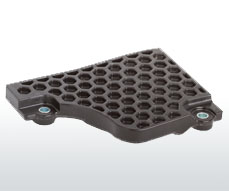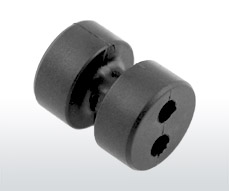Thermoset Use in Automotive Components
 Thermosets are a material of choice for some automotive applications due to the unique material properties that thermoset composites offer. Thermosets are able to be injection or compression molded, lending themselves to complex geometries that may be difficult or costly to achieve in metal or stainless steel. Property-wise, thermosets have chemical resistance against many types of automotive fluids such as oils, transmission fluids, and coolants. Whereas a thermoplastic molded part may degrade in such chemicals, thermoset parts remain durable and strong, allowing a product assembly to remain safe for use. Another material benefit of thermoset composites towards automotive applications is thermosets heat resistance and ability to withstand high operating temperatures.
Thermosets are a material of choice for some automotive applications due to the unique material properties that thermoset composites offer. Thermosets are able to be injection or compression molded, lending themselves to complex geometries that may be difficult or costly to achieve in metal or stainless steel. Property-wise, thermosets have chemical resistance against many types of automotive fluids such as oils, transmission fluids, and coolants. Whereas a thermoplastic molded part may degrade in such chemicals, thermoset parts remain durable and strong, allowing a product assembly to remain safe for use. Another material benefit of thermoset composites towards automotive applications is thermosets heat resistance and ability to withstand high operating temperatures.
 Applications near an engine or transmission may see elevated operating temperatures, requiring a part to withstand such temperatures and heat without disforming or creating safety hazards in the application. Another emerging application for thermosets in automotive is with Electric Vehicle (EV) components. Thermosets offer excellent arc and track resistance along with very strong dielectric and electrical insulation performance, making thermosets suitable for electrical covers, housings, power and terminal blocks, battery components, and other applications that experience electrical voltage or wiring. Cost-wise, thermoset composites such as Bulk Molding Compounds (BMCs) and Phenolics are priced competitively in the $1.00 – $3.50 range depending on commercial volume and formulation, allowing them to compete with advanced thermoplastics and metallic solutions at an advantageous price point for raw material.
Applications near an engine or transmission may see elevated operating temperatures, requiring a part to withstand such temperatures and heat without disforming or creating safety hazards in the application. Another emerging application for thermosets in automotive is with Electric Vehicle (EV) components. Thermosets offer excellent arc and track resistance along with very strong dielectric and electrical insulation performance, making thermosets suitable for electrical covers, housings, power and terminal blocks, battery components, and other applications that experience electrical voltage or wiring. Cost-wise, thermoset composites such as Bulk Molding Compounds (BMCs) and Phenolics are priced competitively in the $1.00 – $3.50 range depending on commercial volume and formulation, allowing them to compete with advanced thermoplastics and metallic solutions at an advantageous price point for raw material.



Comments are closed